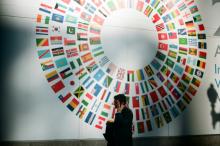On 24 March 2023, UNU-IAS co-organised a side event of the UN 2023 Water Conference on the theme Global to Local Water Security Assessment: How Do We Measure Up and How Close Are Our Targets Mid-way To SDG 6? It discussed the status of water security with a focus on indicators and data, bringing together experts from academia, UN entities, civil society, and development banks. The event considered gaps and challenges related to metrics for SDG 6 (clean water & sanitation) and the UN Water Action Decade objectives. It followed an earlier side event organised by UNU-IAS on 18 March, which focused on valuing urban water in Asia.
Opening the session, Kaveh Madani (Director, UNU-INWEH) announced the launch of a new report, the Global Water Security 2023 Assessment, which warns that the world is not on track to meet SDG 6 by 2030. He emphasised that this lack of progress had also hindered the advancement of other SDGs, and that neither the abundance of water nor financial resources alone could guarantee water security for all.
Kensuke Fukushi (Academic Programme Advisor, UNU-IAS; Vice Director, Institute for Future Initiatives, the University of Tokyo) introduced a water valuation framework developed by UNU-IAS to provide a comprehensive picture of the role of water for sustainable development in Asia. Highlighting the interdependence between economy, environment, and human well-being, he stressed the need for integrated tools that evaluate the multiple dimensions of water and promote better management of water resources in growing economies.
Discussing the importance of regional partnerships for water security research and enhanced cooperation in Asia, Shinobu Yume Yamaguchi (Director, UNU-IAS) highlighted the newly formed Partnership for Urban Water Sustainability in Asia. This UNU-IAS initiative will connect academic institutions and governments in the region to develop comprehensive sustainable water management indicators. Prof. Yamaguchi also underlined the importance of evidence-based knowledge and solutions for ensuring water security.
A panel session and interactive discussion with participants highlighted issues including integrated monitoring of SDG 6; the role of civil society in bringing evidence into policy and practice; water accessibility challenges in East Africa; and reducing water inequalities.
The event was co-organised by UNU-INWEH, Northwestern University, Asian Development Bank (ADB), World Health Organization (WHO), WaterAid, UNU-IAS, and UNU-FLORES.

